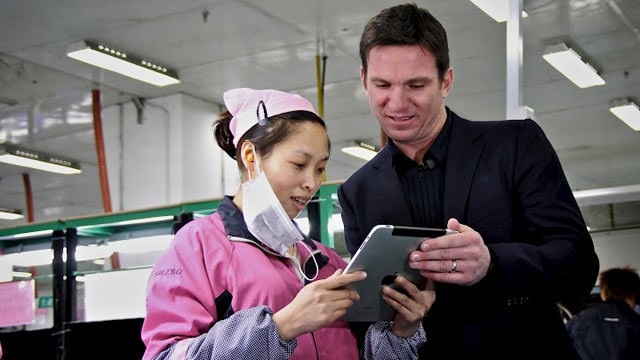In Mike Daisey's description of the factory town in Southeast China where tens of millions of Apple devices are assembled, the first functioning iPad a Foxconn worker ever saw was the one the visitor from America showed him.
Elmer-DeWitt offers it up as a kind of Nelsonesque HAHA moment—oh, that Mike Daisey! He got *so* many things wrong! Thank goodness we finally got rid of him so that real journalists could tell you THE TRUTH.
Elmer-DeWitt neglects to mention that my trip to China was in May of 2010, just two months after the iPad was introduced, and before it was even available in China. *Everyone* I encountered there had never seen an iPad—I used mine like a golden ticket, and started many conversations with lots of people by allowing them to play with mine.
More to the point: years after I had been in China, when Nightline went in February of 2012, nearly two years after I had been there, they easily found workers at Foxconn who had never touched a working iPad before. In fact, here is a picture of Bill Weir with Zhou Xiaoying on the factory floor.

Some in the tech industry still don't want to understand that when I constructed the first version of my monologue I didn't fabricate out of thin air—I went to China, traveled to these areas, and supplemented what I could see with a decade's worth of NGO reports, interviews with labor scholars in Hong Kong, and every piece of writing I could find on the subject.
I told a story about a worker experiencing wonder at seeing an iPad because I spoke to person after person who had expressed precisely that wonder to me.
The fact is that even right now many workers at Foxconn have probably probably still never touched an iPad other than the PR stunt the FLA pulled by having them fill out multiple-choice surveys as a substitute for real labor interviews. This is the kind of methodology that led to the FLA declaring that problems at Foxconn were all being solved ahead of schedule just weeks before we learned that Foxconn was still using both forced student labor and child labor.
Here's where we get to the interesting line between fact and fiction. DeWitt's piece is titled:
Video: Foxconn's factory workers get an Apple Store
Makes sense—it's catchy, counterintuitive, and should garner some hits. It's also fact checkable—after all, the store is in Shenzhen, right? And that is where Foxconn has workers, right?
Except, like many works of journalism, it absolutely fact checks, and is absolutely wrong.
A Foxconn factory worker would have to spend months of their salary to buy an iPad. Months. The idea that this Apple store exists for the factory workers is a perverse joke.
The fact is that the core of Shenzhen is in many ways much more modern than New York—it was built from the ground up in thirty years, and has every amenity we can dream of in our high-tech age. Then, outside the central areas is the factory zone, which is where factories like Foxconn's exist…and, as I and many others have pointed out before, factories that are even more unsavory than Foxconn's as you move down the food chain.
Ironically, if Elmer-DeWitt didn't understand how Shenzhen works in this regard, he could have garnered it from my monologue. I go to some pains to describe the history of Shenzhen in brief, explicating the relationship between the core and the factory zone and their relationship.
I never call Shenzhen a "factory town" any more than I've ever described the production lines at Foxconn as "Dickensian"—these are all projections from our Western experiences, as we grasp for ways to talk about what's happening, and call on reference points we know. I wouldn't have said either of those things both because they aren't true, and because they would also be lazy, weak writing.
What's most curious is how a person as smart as Elmer-DeWitt, whom I've known for a few years, could engage in this kind of title and Twitter baiting.
More and more tech writers are finally telling stories from China, like Jay Greene's excellent series for CNET—the time when we can be so ignorant about labor that we pretend this Apple Store is for factory workers is finally, mercifully, coming to an end.
